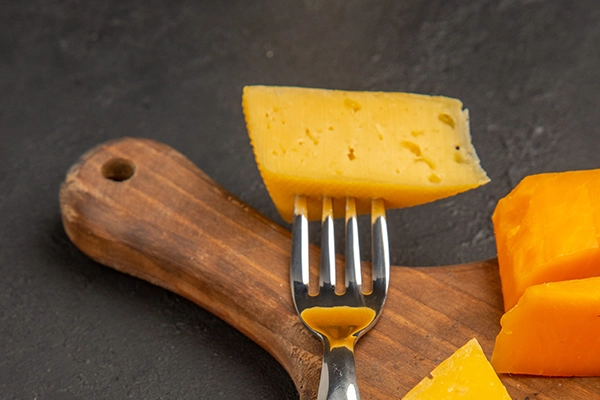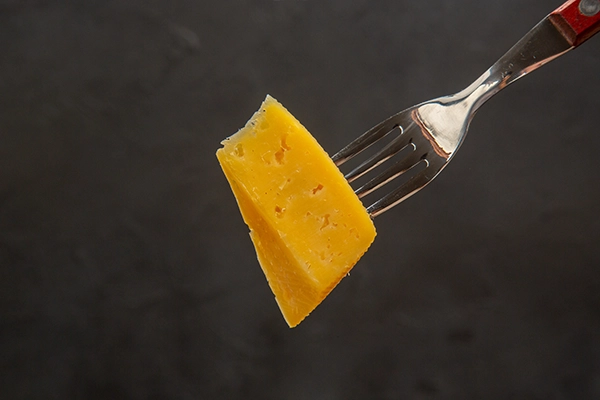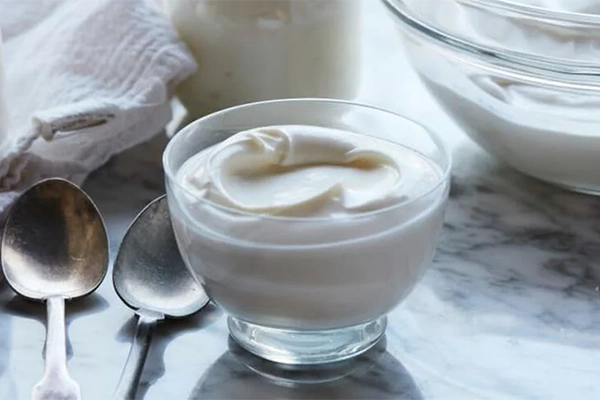Cheddar cheese is one of the most delicious and commonly used forms of cheese available which can be seen being used in cooking as well as served as a snack. The cheese is uniquely flavoured and firm in texture, which can easily be blended with various dishes. In this article, we will talk about cheddar cheese nutritional information and examine its health benefits and advantages.

Cheddar Cheese Nutritional Information
Cheddar cheese nutritional information reveals that it is a rich source of fat, protein, and minerals that can greatly help your daily diet. Each 30 grams of cheddar cheese (one normal sheet) has about 110 calories, of which most are from protein and fat.
Cheddar Cheese Calories
Cheddar cheese is a very good source of energy, but you have to be careful while consuming it. There are approximately 9 grams of fat in each 30 grams of cheddar cheese, which can be a good source of energy. But the calorie content of cheddar cheese can be a bit high for weight losers. Therefore, it is better to consume cheddar cheese in small amounts and along with other sources of food.
Cheddar Cheese Nutrition
In addition to calories and fat, cheddar cheese nutrition also contains tremendous amounts of calcium, phosphorus, and vitamins A and B12. Such nutrients are able to fortify bones, teeth, and the immune system. In addition, cheddar cheese also contains proteins that are important in mending muscles and muscle development. Thus, consuming cheddar cheese is able to improve body well-being and healthy muscle function.
Cheddar Benefits
- Constructing Bones: One of the main benefits of cheddar cheese is that it is high in calcium. Calcium is an essential compound for constructing and maintaining bones and teeth. Because of this, consuming cheddar cheese can help avoid diseases such as osteoporosis.
- Oral Health: In addition to calcium, cheddar cheese contains phosphorus that is required to maintain healthy teeth. These vitamins underpin the structure of the teeth and prevent them from suffering damage.
- Immune System Support: Cheddar cheese’s vitamins A and B12 can be utilized to boost the immune system and render the body resistant to disease.
Cheddar Health Benefits
- Maintaining Heart Health: Cheddar cheese contains a reasonable amount of healthy fats, which, when consumed in moderation, will maintain heart health.
- Weight Management: While very calorie-dense, cheddar cheese is very high in protein, which will keep you satisfied and help in appetite suppression and weight management.
- Reduction in Inflammation: Cheddar cheese nutrition could decrease body inflammation and act as a natural anti-inflammatory agent.
In summary, cheddar cheese nutritional information shows that even with comparatively high fat and calorie content, the cheese contains high levels of protein, calcium, and vitamins that could promote overall health. Moderate consumption could have a variety of benefits to bone, tooth, and immune system health.
If you are looking for a healthy source of protein to include in your diet, cheddar cheese is possibly a very good choice. Just keep in mind, moderation will make you appreciate the nutritional benefit of cheddar cheese without experiencing its negative effects.
How to Use Cheddar Cheese in Moderation?
In order to consume cheddar cheese moderately, you must take note of some key points in order to gain from its nutritional advantages while also staying away from its potential damages.
1. Intake in Moderate Quantities
One of the major tips for consuming cheddar cheese moderately is to limit its consumption. Given that cheese has a high calorie content, excessive consumption can lead to weight gain. Instead of eating a lot of cheddar cheese, it is better to consume it as part of a composite meal with other foods that have minimal calories. For example, cheddar cheese can be utilized to prepare sandwiches or vegetable salads.
2. Companionship with Other Nutrients
Nutrition in cheddar cheese is not only protein and fat. Cheddar cheese contains calcium, phosphorus, and vitamins A and B12, which are of immense benefit for the health of the body. For maximum benefit from cheddar cheese, you can combine it with foods that have fiber, such as vegetables and fruits, so that you have a healthier meal.
3. Controlling Overconsumption During the Day
Although cheddar benefits are many, overconsumption can cause unhealthy fats in the body. One therefore has to utilize it as a supplement, not eating cheddar cheese in every meal. For example, a serving of cheddar cheese with a meal can satisfy your body’s nutritional needs without any disadvantages.
4. Cheddar Health Benefits When Consumed in Moderation
If you consume cheddar cheese in moderation, you can enjoy several body health advantages. For example, cheddar health advantages consist of bone and tooth strengthening due to the calcium content present in it. Besides, the vitamin B12 in cheddar cheese maintains the nervous system functioning properly. Also, consuming this cheese in the right amount can support your immune system.
5. Use Low-Fat Versions Wisely
If you are concerned about the cheddar cheese calories and want to reduce its consumption in your diet, you can use low-fat versions of the cheese. There are some brands that produce cheddar cheese with a lower percentage of fat, which allows you to consume fewer calories but still enjoy the taste of the cheese.
In order to benefit from cheddar cheese nutrition facts and enjoy the health benefits of cheddar, you should eat it in moderation. With moderation in eating cheddar cheese and pairing it with other healthy foods, you can enjoy all the benefits of this cheese without worrying about its drawbacks.
Key Information on Cheddar Cheese Nutrition for Different Diets
1. Low-Calorie Diet or Weight Loss
For low-calorie dieters, regulation of cheddar cheese calories intake is important. Cheddar cheese contains high levels of saturated fats, and these are capable of easily adding high levels of calories to the diet. Therefore, it is best to practice moderation when using this type of cheese. Applying the cheese to low-calorie diets can be best achieved by consuming it in small amounts or as a vegetable or salad topping.
2. High-Protein Diet
Those looking to boost protein intake will benefit from cheddar cheese nutrition as the cheese is a high-protein food that muscle growth and repair require. For diets rich in protein, benefits of cheddar include helping muscle growth and repair as well as providing the body with needed protein. In such diets, you can use cheddar cheese as a good source of protein in your foods, but you should also consider its fat content.
3. Low-Fat Diet
Those who follow a low-fat diet must be careful about fats and calories present in cheese. Here, we recommend that you use cheddar cheese whose percentage of fat is low so that you will get all the health benefits of cheddar without taking lots of calories and fat in the body. Or else, you may also include low-fat cheddar cheese with other low-fat foods.
4. Vegetarian or Vegan Diet
If your diet is vegetarian, regular cheddar cheese may not be suitable due to the use of animal ingredients in it. For people on a vegan diet, plant-based cheddar cheese or non-dairy cheeses available in the market can be a good alternative. These types of cheeses can have similar characteristics, including the taste and texture of cheddar cheese, but they are free of animal ingredients, as cheddar cheese nutritional information shows.
5. Diabetic Diets
People who have diabetes should be aware of cheddar cheese calories and its effect on blood sugar. Cheddar cheese is low in glucose and high in protein, and this can help regulate blood sugar levels. However, due to its high fat and calorie value, it would be better to eat it sparingly and in combination with other foods that are low in glycemic index.
6. Anti-Inflammatory Diets
Anti-inflammatory diets recommend eating foods that are high in healthy fats and antioxidants. Cheddar Health Benefits include reducing inflammation and aiding the health of your heart. Cheddar cheese, as it is high in calcium, phosphorus, and vitamins A and B12, can help you build up your immune system and reduce inflammation in your body. But you need to keep your intake in moderation to avoid the negative effects of its saturated fats.

7. Nutrient-Rich Diets & Calcium and Bone Health
Cheddar cheese is a rich source of calcium, which is greatly beneficial for people who desire to strengthen their bones and teeth. In calcium-dense diets, the consumption of this cheese can enhance bone strength and prevent conditions such as osteoporosis. This is among the cheddar advantages that is greatly beneficial to elderly people and those at risk of fractures of the bone.
Generally, in order to apply cheddar cheese nutritional data in various diets, you should be aware of your body’s individual demands. According to the diet you adhere to, you can use this type of cheese in a well-balanced and self-aware manner to enjoy the health benefits offered by cheddar. Keep in mind that it is important for any diet to measure cheddar cheese calories intake and monitor its fat and proteins.
Conclusion
In conclusion of this article, it should be noted that cheddar cheese nutritional information shows that this cheese is one of the rich and diversified sources of nutrients that can have numerous benefits on the health of the body.
Considering the high cheese calories, its intake should be controlled and balanced in a manner to gain its benefits without creating issues such as weight gain or unhealthy fat. Cheddar cheese nutrition includes protein, calcium, phosphorus, vitamins A and B12, which are highly beneficial to the health of bones, teeth and the immune system. In addition, cheddar advantages such as muscle strengthening, heart well-being, and reducing inflammation are other prominent features of this cheese. Furthermore, depending on each diet’s respective needs, its health benefits could be harnessed. People who follow low-calorie, high-protein, or low-fat diets can include cheddar cheese in their regimen and reap the nutritional benefits. Ultimately, you can reap all of its advantages if you consume cheddar cheese moderately and paired with other foods. Remember that nutritional facts of cheddar cheese have to be checked thoroughly in order for it to be incorporated into various diets.










